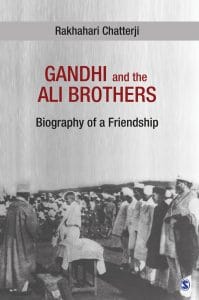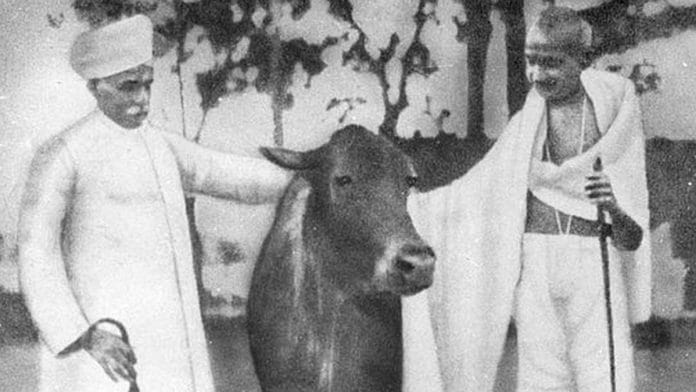Although Gandhi described himself as a sanatani (true or pure) Hindu, he had nothing in common with the Rashtriya Swayamsevak Sangh (RSS) which believed in equating Hindu interests with Indian interests. As Rajmohan Gandhi says, on the ‘crucial questions of Indian nationhood—Hindu–Muslim relations, militarization, the use of violence, and an Indian flag—the RSS ideology was…fundamentally opposed to Gandhi’s’.
Gandhi was a great enthusiast for cow protection and would preside over many campaign meetings of the Cow Protection Society; yet he refused to use cow protection as a bargaining chip for his support to the Khilafat Movement. He had a long-time and respectful personal relationship with Pandit Madan Mohan Malaviya, Lala Lajpat Rai and Swami Shraddhananda—the chief spokesmen of Hindu interests and the main forces behind shuddhi (purification) and sangathan (consolidation) movements among the Hindus and a ‘partial ideological rapport’ with them.
He had described Malaviya as ‘a great leader of India’ and ‘the patriarch of Hinduism’. Gandhi had attended the inaugural meeting of the Hindu Mahasabha in Hardwar in 1915, and he maintained contacts with the Arya Samaj and its educational organization, the Gurukuls. Quite understandably, he wanted to carefully nurture a base for himself within Hindu organizations. Yet, while he went a great length with them, he could not go the whole length.
Gandhi had his own view of Hinduism which was founded on an amalgam of reason and belief within which the former was more prominent than the latter. It was not always in tune with orthodox Hindu leaders and organizations. Whether speaking at Gurukul organizations or at cow protection meetings, Gandhi would often strike a critical and discordant note. He believed and pointed out that Gurukul education was deficient in many respects and advised the Arya Samajists to introduce training in agriculture, handicrafts and sanitation.
Also read: We can’t talk about Gandhi if we don’t speak up on Kashmir and lynchings
On cow protection, which was dear to his heart, he was quite candid in accusing the Hindus of hypocrisy, for while they condemned cow slaughter by the Muslims and were ready to go to any length for stopping this, they often maltreated their cattle and sold them to the Muslims. He disagreed with Malaviya and others on the question of shuddhi and sangathan, for he did not believe that ‘the Indian National Congress, despite Hindu majority, could not be taken to protect Hindu interests, and therefore, separate communal organizations like the Hindu Mahasabha and Sangathan are absolutely necessary’.
In his efforts to court Hindu leaders and organizations, his goal was to make them more malleable and accommodative to the Muslims and to encourage them to develop a tolerant, non-violent and inclusive approach to public issues and questions rather than to give in to their stance.
 This excerpt from Gandhi and the Ali Brothers: Biography of a Friendship by Rakhahari Chatterji, 2013, has been published with permission from SAGE India. Paperback: Rs 825
This excerpt from Gandhi and the Ali Brothers: Biography of a Friendship by Rakhahari Chatterji, 2013, has been published with permission from SAGE India. Paperback: Rs 825






